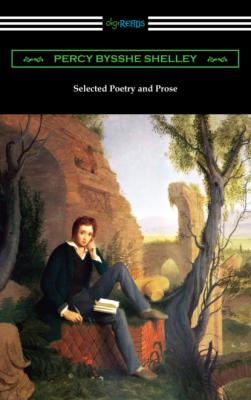Selected Poetry and Prose. Percy Bysshe Shelley
Чтение книги онлайн.
Читать онлайн книгу Selected Poetry and Prose - Percy Bysshe Shelley страница 72

II.
Yet it is less the horror than the grace
Which turns the gazer’s spirit into stone;
Whereon the lineaments of that dead face
Are graven, till the characters be grown
Into itself, and thought no more can trace;
’Tis the melodious hue of beauty thrown
Athwart the darkness and the glare of pain,
Which humanize and harmonize the strain.
III.
And from its head as from one body grow,
As [ ] grass out of a watery rock,
Hairs which are vipers, and they curl and flow
And their long tangles in each other lock,
And with unending involutions shew
Their mailed radiance, as it were to mock
The torture and the death within, and saw
The solid air with many a ragged jaw.
IV.
And from a stone beside, a poisonous eft
Peeps idly into those Gorgonian eyes;
Whilst in the air a ghastly bat, bereft
Of sense, has flitted with a mad surprise
Out of the cave this hideous light had cleft,
And he comes hastening like a moth that hies
After a taper; and the midnight sky
Flares, a light more dread than obscurity.
V.
’Tis the tempestuous loveliness of terror;
For from the serpents gleams a brazen glare
Kindled by that inextricable error,
Which makes a thrilling vapour of the air
Become a [ ] and ever-shifting mirror
Of all the beauty and the terror there—
A woman’s countenance, with serpent locks,
Gazing in death on heaven from those wet rocks.
OZYMANDIAS
I met a traveller from an antique land,
Who said—“Two vast and trunkless legs of stone
Stand in the desert. . . . Near them, on the sand,
Half sunk a shattered visage lies, whose frown,
And wrinkled lip, and sneer of cold command,
Tell that its sculptor well those passions read
Which yet survive, stamped on these lifeless things,
The hand that mocked them, and the heart that fed;
And on the pedestal, these words appear:
My name is Ozymandias, King of Kings;
Look on my Works, ye Mighty, and despair!
Nothing beside remains. Round the decay
Of that colossal Wreck, boundless and bare
The lone and level sands stretch far away.”—
PETER BELL THE THIRD
By Miching Mallecho, Esq.
“Is it a party in a parlour,
Crammed just as they on earth were crammed,
Some sipping punch—some sipping tea;
But, as you by their faces see,
All silent, and all—damned!”
Peter Bell, by W. WORDSWORTH.
“OPHELIA. What means this, my lord?
HAMLET. Marry, this is Miching Mallecho; it means mischief.”
SHAKESPEARE.
Dedication.
TO THOMAS BROWN, ESQ., THE YOUNGER, H.F.
DEAR TOM,—Allow me to request you to introduce Mr. Peter Bell to the respectable family of the Fudges. Although he may fall short of those very considerable personages in the more active properties which characterize the Rat and the Apostate, I suspect that even you, their historian, will confess that he surpasses them in the more peculiarly legitimate qualification of intolerable dulness.
You know Mr. Examiner Hunt; well—it was he who presented me to two of the Mr. Bells. My intimacy with the younger Mr. Bell naturally sprung from this introduction to his brothers. And in presenting him to you, I have the satisfaction of being able to assure you that he is considerably the dullest of the three.
There is this particular advantage in an acquaintance with any one of the Peter Bells, that if you know one Peter Bell, you know three Peter Bells; they are not one, but three; not three, but one. An awful mystery, which, after having caused torrents of blood, and having been hymned by groans enough to deafen the music of the spheres, is at length illustrated to the satisfaction of all parties in the theological world, by the nature of Mr. Peter Bell.
Peter is a polyhedric Peter, or a Peter with many sides. He changes colours like a chameleon, and his coat like a snake. He is a Proteus of a Peter. He was at first sublime, pathetic, impressive, profound; then dull; then prosy and dull; and now dull—oh so very dull! it is an ultra-legitimate dulness.
You will perceive that it is not necessary to consider Hell and the Devil as supernatural machinery. The whole scene of my epic is in ‘this world which is’—so Peter informed us before his conversion to White Obi—
‘The world of all of us, and where
We find our happiness, or not at all.’
Let me observe that I have spent six or seven days in composing this sublime piece; the orb of my moonlike genius has made the fourth part of its revolution round the dull earth which you inhabit, driving you mad, while it has retained its calmness and its splendour, and I have been fitting this its last phase ‘to occupy a permanent